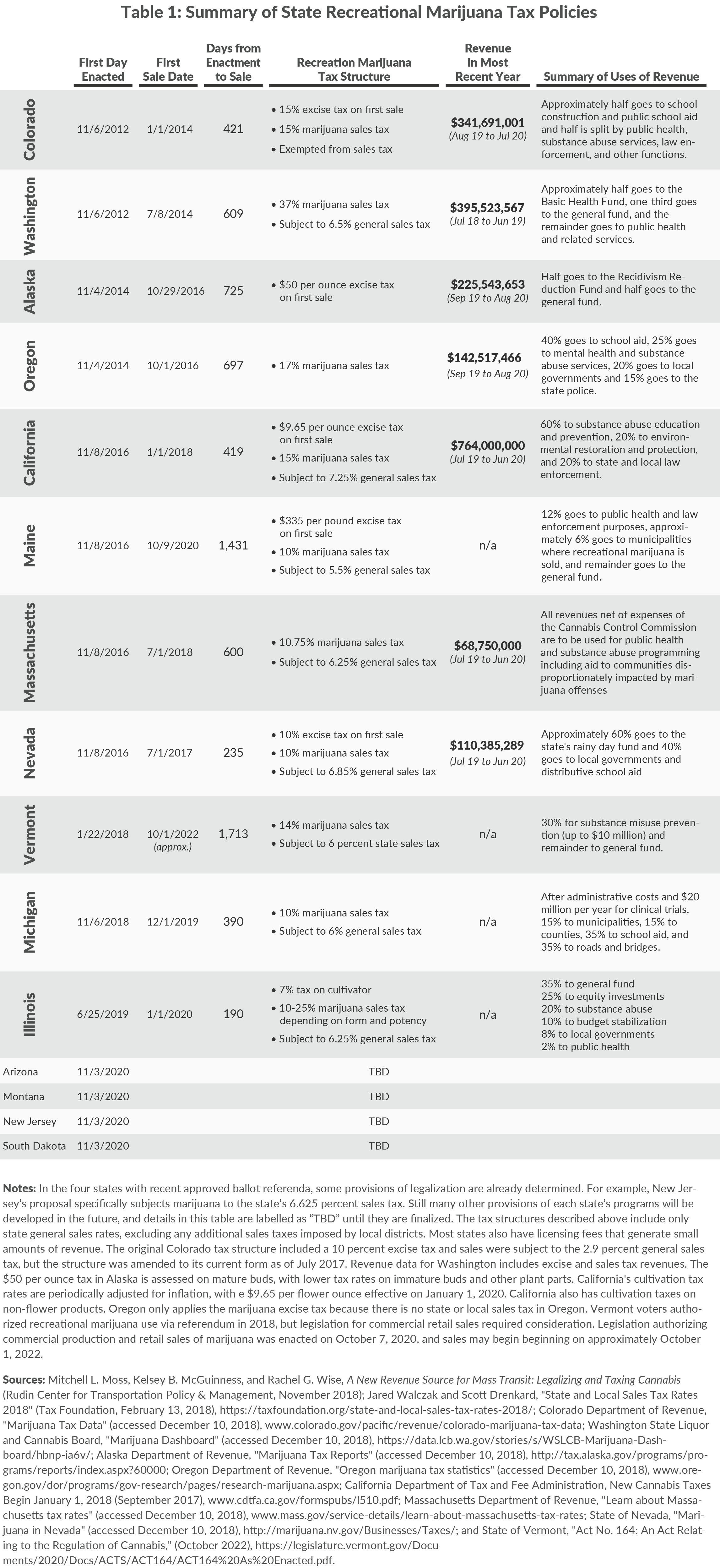Getting Into the Weeds About Potential Recreational Marijuana Revenues
Introduction
Referenda to legalize adult use recreational marijuana were on ballots in four states—Arizona, Montana, New Jersey, and South Dakota—this year, and passed in each.1 These states join 11 others that already have legalized recreational adult use of marijuana; now, three of New York’s bordering states have or will soon have recreational marijuana markets. Retail sales in Massachusetts began in 2018 and Vermont’s legislature recently finalized provisions to begin sales in 2022. Some elected leaders are calling for New York to join these states and are touting the revenue-raising potential of creating a new market; however, State leaders should be cautious about relying on these potential revenues to help close budget gaps. Experience in other states shows that it takes approximately three to four years to realize consistent tax revenues.
Marijuana Legalization Proposals in New York
Governor Andrew Cuomo’s last two Executive budgets have proposed marijuana legalization.2 In pursuit of regional alignment on marijuana legalization, Governor Cuomo and some neighboring governors (including New Jersey Governor Phil Murphy) convened to discuss “a collaborative joint regional approach to marijuana and vaping legislation and policies” in October 2019.3 Assembly Speaker Carl Heastie and Senate Majority Leader Andrea Stewart-Cousins also have signaled their support, and during the 2020 legislative session, Senate Finance Committee chair Liz Krueger and Assembly Majority Leader Crystal Peoples-Stokes introduced legalization bills in their respective houses.4
Although the Governor, Assembly Speaker, and Senate Majority Leader are in favor of legalization, they have not agreed on a proposal. Key differences are focused on licensure details, dedicated uses of tax receipts, and public health and safety concerns. With four more states, including New Jersey, on the path to legalization, proposals are certain to be considered again during the 2021 Legislative session.5
Principles for Budgeting Potential Tax Receipts
Any proposal that advances should follow three general precepts for budgeting marijuana tax revenue:
1. Be cautious and pragmatic: Recreational marijuana revenues would depend on implementing new tax, licensing, and oversight structures that take approximately 12 to 18 months based on experiences in other states. In states that have begun selling recreational marijuana, the time from legalization to the date of first commercial sale has been between 190 days and 1,713 days. While each state’s approach and experience is unique, the fastest time to launch a retail marijuana market was in the most recent state to legalize (Illinois). (See Table 1.) When implemented, the legal market does not mature immediately; it takes at least another two years to realize robust tax receipts. Thus, it would likely take three to four years from legalization for the State to yield consistent receipts. Even after legalization, legal retailers still compete with lingering illicit markets, dampening legal sales and associated tax revenues.6
2. Keep revenues on-budget: Any future revenue should be received and spent on-budget, not through off-budget trusts or other fiscal gimmickry.
3. Free from capture: The revenue should not be committed to a specific purpose. Marijuana revenue will be recurring and reliable when the market is mature and should be used for recurring operating budget purposes, as determined by elected leaders in each year’s budget process. Dedicating a portion to cover administrative costs and fund consequential public health and substance abuse programming may be reasonable. Vermont and Maine are the only states that have dedicated a majority share of revenues to their state’s general fund.

Conclusion
Other states’ experiences clearly demonstrate that it takes time for legalized marijuana tax revenues to be realized, but early implementor states now generate significant and consistent revenues. If New York legalizes and taxes the recreational adult use of marijuana, it should be pragmatic in estimating revenues, transparent on the sources and uses of those revenues, and not dedicate the revenues except to administration and perhaps programs related to the consequence of use.
Footnotes
- Bruce Y. Lee, “4 States Vote To Legalize Recreational Marijuana Use: Arizona, Montana, NJ, South Dakota,” Forbes (November 4, 2020), www.forbes.com/sites/brucelee/2020/11/04/4-states-vote-to-legalize-recreational-marijuana-use-arizona-montana-nj-south-dakota/?sh=2ad0dcf6558f.
- See New York State Legislature, Part VV of S.1509/A.2009 (2019-2020 Session), and Part BB of S.7509/A.9509 (2019-2020 Session).
- Governor Andrew M. Cuomo, “Governor Cuomo, Governor Lamont, Governor Murphy and Governor Wolf Co-Host Regional Cannabis Regulation and Vaping Summit” (press release, October 17, 2019), www.governor.ny.gov/news/governor-cuomo-governor-lamont-governor-murphy-and-governor-wolf-co-host-regional-cannabis.
- Denis Slatery, “New York still rolling towards legalizing recreational marijuana as lawmakers prepare for budget talks,” Daily News (March 4, 2019), www.nydailynews.com/news/politics/ny-pol-marijuana-new-york-legalization-state-politics-20190226-story.html; and New York State Legislature, S.1527-C/A.1617-C, “Marihuana Regulation and Taxation Act” (2019-2020 Session).
- Ryan Deffenbaugh, “Cuomo says time is 'ripe' for recreational marijuana following New Jersey's approval” Crain’s (November 5, 2020), www.crainsnewyork.com/politics/cuomo-says-time-ripe-recreational-marijuana-following-new-jerseys-approval.
- Bill Chappell, “California Says Its Cannabis Revenue Has Fallen Short Of Estimates, Despite Gains,” NPR (August 23, 2019), www.npr.org/2019/08/23/753791322/california-says-its-cannabis-revenue-has-fallen-short-of-estimates-despite-gains.